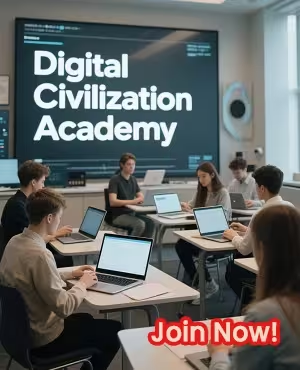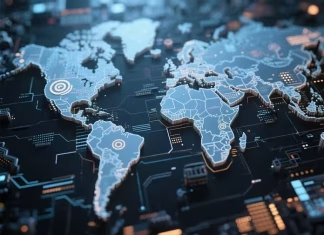
The digital revolution has fundamentally transformed every aspect of human society, but perhaps nowhere is this transformation more profound than in education. As we stand at the threshold of unprecedented technological advancement, the future of digital learning promises to reshape not just how we acquire knowledge, but the very fabric of human civilization itself.
The Unstoppable Rise of Digital Education
Traditional classrooms with their rigid schedules and geographical limitations are rapidly becoming relics of the past. The future of digital learning is painting a radically different picture—one where education transcends physical boundaries, time zones, and socioeconomic barriers. This isn’t merely an evolution; it’s a complete paradigm shift that’s democratizing knowledge on a scale never before imagined.
Recent global events have accelerated this transformation exponentially. What once seemed like a distant future has become our present reality, with millions of students worldwide discovering that quality education doesn’t require a physical classroom. The implications are staggering: we’re witnessing the birth of a truly global classroom where a student in rural Indonesia can learn from the same professor teaching at Harvard.
Artificial Intelligence: The Game-Changer in Educational Evolution
The future of digital learning is being revolutionized by artificial intelligence in ways that seem almost magical. Imagine an educational system that adapts to your learning style in real-time, identifies your weaknesses before you even recognize them, and creates personalized curricula tailored specifically to your cognitive patterns.
AI-powered learning platforms are already making this vision reality. These systems analyze millions of data points from student interactions, creating detailed learning profiles that enable unprecedented personalization. No longer will students struggle with one-size-fits-all approaches; instead, they’ll experience education that evolves with their unique needs and capabilities.
Virtual tutors powered by advanced AI are becoming indistinguishable from human instructors, available 24/7 to answer questions, provide explanations, and offer encouragement. These digital mentors never get tired, never lose patience, and can simultaneously help thousands of students across the globe.
Immersive Technologies: Learning Beyond Reality
The future of digital learning extends far beyond traditional screens and keyboards. Virtual Reality (VR) and Augmented Reality (AR) are creating immersive educational experiences that were once pure science fiction. Students can now walk through ancient Rome, manipulate molecular structures with their hands, or practice surgical procedures without risk.
These technologies are solving one of education’s greatest challenges: making abstract concepts tangible and memorable. Complex scientific principles become interactive experiences, historical events unfold before students’ eyes, and theoretical knowledge transforms into practical understanding through virtual hands-on practice.
Mixed reality environments are emerging as the ultimate learning spaces, where physical and digital elements seamlessly blend. Students can collaborate in virtual laboratories, attend lectures in digitally reconstructed historical settings, or explore the cosmos from their living rooms.
Microlearning and the Attention Economy
The future of digital learning recognizes a fundamental truth about modern cognitive patterns: attention spans are fragmenting, but learning opportunities are multiplying. Microlearning—delivering education in small, focused bursts—is becoming the dominant pedagogical approach.
This shift acknowledges that effective learning doesn’t require hours of continuous study. Instead, strategic five-to-ten-minute learning sessions, strategically spaced throughout the day, can be more effective than traditional lengthy classroom sessions. Mobile-first learning platforms are capitalizing on this insight, turning commute time, coffee breaks, and waiting periods into valuable learning opportunities.
Gamification elements are being woven into these microlearning experiences, creating addictive educational content that students genuinely want to engage with. Achievement badges, progress tracking, and social learning challenges are transforming education from an obligation into an entertainment experience.
Breaking Down Global Educational Inequality
Perhaps the most revolutionary aspect of the future of digital learning is its potential to eliminate educational inequality on a global scale. High-quality education, once the privilege of the wealthy few, is becoming accessible to anyone with an internet connection.
Massive Open Online Courses (MOOCs) have already begun this transformation, but the future promises even more dramatic changes. Blockchain technology is enabling secure, verifiable digital credentials that employers worldwide recognize. Students in developing nations can now earn internationally recognized qualifications without leaving their communities.
Real-time language translation is removing linguistic barriers, allowing students to access the world’s best educational content regardless of their native language. This linguistic democratization is creating a truly global knowledge commons where geographical location no longer determines educational opportunity.
The Social Fabric of Digital Learning Communities
Contrary to fears about digital isolation, the future of digital learning is fostering unprecedented global communities. Students from different continents collaborate on projects, share perspectives, and build relationships that transcend traditional cultural boundaries.
These digital learning communities are becoming powerful networks that extend far beyond the classroom experience. Alumni networks, mentorship programs, and professional connections formed in virtual environments are proving as valuable as those created in traditional institutions.
Social learning algorithms are connecting students with similar interests, complementary skills, and shared goals, creating study groups and project teams that might never have formed in geographical limitations of traditional education.
Challenges and Ethical Considerations
The future of digital learning isn’t without significant challenges. Digital divide issues persist, with reliable internet access remaining unavailable to billions globally. Privacy concerns around student data collection and AI algorithmic bias in educational recommendations require careful consideration.
The psychological impact of reduced face-to-face interaction, particularly for younger learners, remains an area of ongoing research. Balancing digital efficiency with human connection will be crucial for sustainable educational transformation.
Preparing for Tomorrow’s Learning Landscape
As we navigate toward this digital educational future, adaptability becomes the most valuable skill. Educators must evolve from information deliverers to learning facilitators and digital literacy coaches. Students must develop self-directed learning capabilities and digital citizenship skills.
The future of digital learning promises a world where education is personalized, accessible, immersive, and globally connected. This transformation isn’t just changing how we learn—it’s reshaping human potential itself, creating opportunities for intellectual growth and cultural exchange that previous generations could never have imagined.
The question isn’t whether digital learning will dominate our educational future, but how quickly we can adapt to maximize its transformative power for the betterment of human civilization.

































